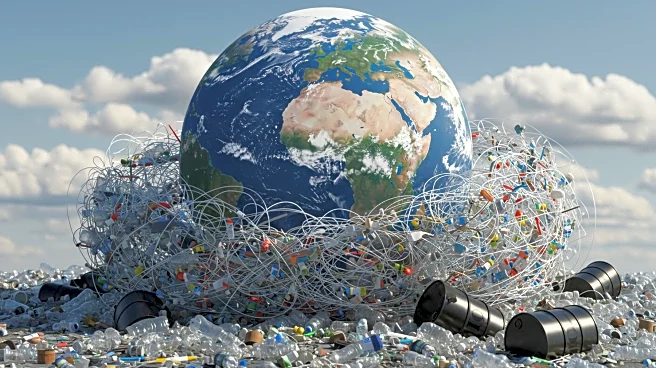What's Happening?
A United Nations conference aimed at establishing a legally binding treaty on plastic pollution has faced significant disruption from oil-producing nations, known as petrostates. The conference, held in Geneva, was intended to finalize a treaty by the end of 2024, addressing the full lifecycle of plastics, including production, design, and disposal. However, countries such as Colombia, the EU, and the UK rejected the draft treaty text, labeling it as 'unacceptable' and 'unambitious' due to its lack of production caps and measures against toxic chemicals. The conference was overwhelmed by fossil fuel and petrochemical lobbyists, leading to accusations of favoritism towards low-ambition countries and procedural chaos. Representatives from small island developing states (SIDS) and other affected nations expressed disappointment, citing the absence of binding measures and financial obligations in the draft text.
Why It's Important?
The disruption at the UN Plastics Conference highlights the ongoing struggle between environmental advocates and powerful petrochemical interests. The failure to reach a consensus on limiting plastic production and addressing harmful chemicals has significant implications for global environmental policy. Countries most affected by plastic waste, particularly small island nations, face disproportionate challenges in managing pollution. The lack of progress in Geneva underscores the influence of petrostates in international negotiations, potentially delaying meaningful action on plastic pollution. This stalemate could hinder efforts to reduce environmental damage and protect vulnerable communities from the impacts of plastic waste.
What's Next?
The conference's collapse suggests that future negotiations will need to address procedural issues and ensure equitable participation from all countries. Stakeholders, including environmental groups and affected nations, are likely to push for a more transparent and inclusive process. The next round of negotiations will need to focus on establishing clear rules and voting mechanisms to prevent further disruptions. Countries committed to ambitious environmental goals may seek alternative platforms to advance their agendas, potentially leading to new alliances and strategies to combat plastic pollution.
Beyond the Headlines
The controversy at the UN Plastics Conference reflects broader issues of resource control and geopolitical power dynamics. The influence of petrostates in stalling environmental agreements raises ethical questions about the role of economic interests in shaping global policy. The ongoing debate over plastic production and waste management may drive long-term shifts in international relations, as countries seek to balance economic growth with environmental sustainability. This situation also highlights the need for innovative solutions and collaborative efforts to address the root causes of plastic pollution.












